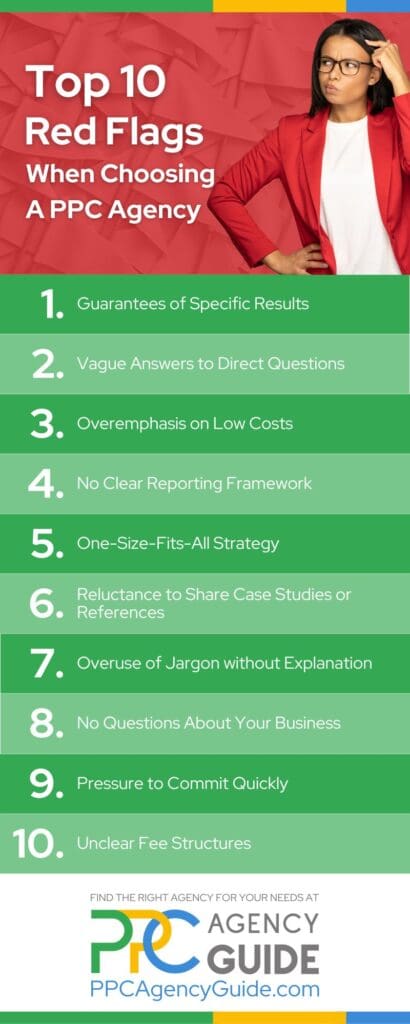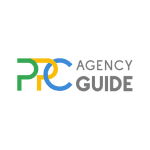
Wouldn’t it be nice if everyone who deserved a red flag actually carried one around? It would make so many things much easier, including choosing a pay-per-click (PPC) agency. While we can’t count on that level of clarity just yet, most of the time, there are some tells that a specific agency is not the right fit. We’ll explore some of these red flags in this guide, plus cover what to do if you spot any in your search.
Best Times to Spot Red Flags in PPC Agencies
In the business-to-business (B2B) sector, a typical sales cycle is anywhere from three to 12 months. (That’s something to remember for your own advertising, and why it can take some time for your PPC ads to produce results.) This also means that there are usually a few weeks or months between the time you first connect with a prospective agency and the time you actually sign, and there are lots of opportunities within this period to catch red flags.
Discovery Call
When you’re in the process of choosing a PPC agency, you’ll generally have a discovery call. It’s usually free and is a brief one-on-one session where you talk to someone at the firm to explore the fit. Use this time to ask questions about how they operate. Keep an ear out for what they say as well as what they don’t.
Proposal and Contract Review
After your discovery call, most agencies will prepare a proposal or draft contract next. This is where you see their recommendations in writing, including services, fees, and deliverables. Go line-by-line through the proposal to see what they’re really committing to.
Early Follow-Up Conversations
If you don’t sign up right away, most PPC agencies will follow up with you to answer additional questions and see what they can do to help you move forward. You can also proactively reach out to them if you have concerns. These are excellent opportunities to ensure everything they’re saying still matches up and push back if you have concerns.
Top 10 Red Flags to Watch When Choosing a PPC Agency
As you connect with PPC agencies, keep an eye out for the red flags outlined below.
1. Big PPC Agency Guarantees and Unrealistic PPC Expectations
If an agency promises exact outcomes, like doubling your leads in thirty days or guaranteeing a fixed return on ad spend, you should take pause. The truth is, no one can make those commitments honestly because so many factors are outside of the agency’s control, including your industry, competition, seasonality, and budget.
Results-Related Green Flags
What you should expect instead is clarity on how they will measure performance and communicate progress. For example, a good agency will explain:
- Benchmarks from Similar Campaigns: They may share average click-through rates, conversion rates, or cost per lead in your industry, making it clear these are reference points, not promises.
- Defined Tracking Methods: They should outline which tools and metrics they will use to monitor campaigns, so you know how success will be evaluated.
- Focus on Process Over Predictions: Rather than hard guarantees, the emphasis should be on their strategy for testing, optimizing, and refining over time.

2. Vague Answers to Direct Questions
When you ask an agency how they manage budgets, optimize campaigns, or report on performance, you should be able to get clear, straightforward answers. If the response feels like buzzwords strung together, or you walk away unsure of what they actually do, that is a signal to slow down.
Answer-Related Green Flags
A strong agency will not just say they “optimize” or “manage ads.” They will give you specifics, such as:
- Budget Allocation Approach: A trustworthy partner will explain how they decide where to spend between platforms like Google Ads, LinkedIn, or Meta.
- PPC Testing and Optimization Methods: Clickthrough rates can double with A/B testing, per WordStream. To gauge if you’ll see continuous improvement in results, listen for details on keyword testing, ad copy refinement, and bid adjustments made in response to performance data.
- Reporting Cadence and Content: You should hear exactly how often updates will be delivered and which metrics will be tracked.
3. Overemphasis on Low Costs
Price matters, but when an agency spends most of the conversation talking about how cheap they are or how they can drive your cost per click lower than anyone else, it is worth taking a closer look. Low costs alone rarely tell the full story of campaign health or business growth.
PPC Cost and Pricing Transparency Green Flags
The best agencies balance cost with value, focusing on the bigger picture of how advertising supports your goals. You might hear them explain things like:
- Total Return on Investment: A thoughtful partner will connect ad spend to revenue and show how campaigns contribute to business growth.
- Lead Quality Over Quantity: Experienced teams emphasize generating leads that convert into customers instead of just driving the lowest cost clicks.
- Smart Budget Allocation: Strong agencies highlight how they use your budget across platforms and campaigns to achieve the best outcomes.
4. No Clear Reporting Framework or Unclear ROI Tracking in PPC
Reports are how you stay connected to what is happening inside your campaigns. If an agency cannot explain what information you will see, how often you will see it, or what the numbers mean, you will struggle to measure success.
Reporting Green Flags
Strong agencies make transparent reporting a cornerstone of their process and set expectations early. Look for details such as:
- Defined Schedule: Agencies should commit to how often you will receive reports, such as weekly, biweekly, or monthly.
- Meaningful Metrics: Good reports include more than impressions and clicks. They highlight conversions, cost per lead, and other measures that show how ads affect your business.
- Clear Explanations: Numbers alone are not enough. The best reports are paired with commentary that explains why performance looks the way it does and what steps will be taken next.
5. One-Size-Fits-All or Vague PPC Campaign Strategy
Every business has different goals, audiences, and competitive challenges. If an agency pitches a generic plan that sounds identical to what they would recommend for any company, it limits your chances of getting meaningful results.
PPC Strategy Transparency Green Flags
Agencies that deliver stronger outcomes show how they adapt PPC strategies to your unique situation. You might notice them talking about:
- Industry-Specific Insights: A tailored partner will reference patterns they have seen in businesses like yours, while making clear they will adapt those lessons to your circumstances.
- Customized Campaign Structure: Instead of a cookie-cutter build, they will explain how ad groups, keywords, and targeting align with your objectives.
- Goal-Oriented Messaging: Rather than recycling the same copy, they will connect ad messaging to what resonates with your particular audience.
6. Reluctance to Share Case Studies or References
An agency’s past work is one of the clearest indicators of what they can deliver. If they hesitate to provide case studies or client references, it may limit your ability to evaluate their experience.
Expertise Green Flags
The strongest agencies showcase success stories and connect you with past or current clients when appropriate. Look for things like:
- Documented Results: Case studies should outline the client’s goals, the strategies used, and measurable outcomes.
- Relevant Experience: The best examples come from businesses that share similarities with yours in industry, size, or objectives.
- Willingness to Connect You: Agencies that believe in their work are often happy to put you in touch with a client who can speak to their partnership.
7. Overuse of Jargon without Explanation
PPC has its own language, filled with acronyms and technical terms. If an agency leans heavily on jargon without breaking it down, it can leave you feeling disconnected from the process.
Language Green Flags
The best partners translate technical details into plain language while still showing expertise. Signs of this include:
- Clarity in Complex Terms: Instead of simply saying “ROAS,” a strong agency will explain that it means return on ad spend and why it matters to your goals.
- Accessible Explanations: Agencies should be able to describe technical steps, such as bid adjustments or audience segmentation, in ways that make sense to non-specialists.
- Balanced Communication: A reliable partner knows when to use technical terms and when to simplify, ensuring you can follow the conversation without losing confidence.
8. No Questions About Your Business
A discovery call should feel like a two-way conversation. If an agency spends the entire time talking about their services without asking about your business, they miss the chance to understand what makes your business and situation unique. That means the ads they create might not be a good fit for your business or customers.
Inquiry Green Flags
Strong agencies use this stage to gather details that shape the strategy. You can expect them to ask about things like:
- Business Goals: They should want to know what you are aiming to achieve, such as lead generation, sales growth, or brand awareness.
- Target Audience: Good agencies ask about your ideal customers, including demographics, pain points, and buying behavior.
- Past Campaigns: They often review your previous marketing efforts to learn what worked, what did not, and where there is room to improve.
9. Pressure to Commit Quickly
Choosing a PPC agency is an important decision, and it should never feel rushed. If you sense pressure to sign right away, it limits your ability to fully evaluate the proposal and make sure the fit is right.
Commitment Green Flags
The best agencies give you space to evaluate your options and make an informed choice. You will often notice them emphasizing things like:
- Open Timelines: A reliable partner allows you to review contracts, ask questions, and compare options without imposing deadlines.
- Supportive Follow-Up: Instead of hard sales tactics, strong agencies use follow-up conversations to answer questions and provide additional clarity.
- Focus on Long-Term Fit: The emphasis stays on building a partnership that aligns with your goals, not on closing the deal quickly.
10. Unclear Fee Structures
How an agency charges for its services can be just as important as the results it delivers. If the fee structure is unclear, it becomes difficult to understand where your money is going and how much of it actually fuels your campaigns.
Fee Structure Green Flags
Agencies with transparent pricing make it easy to see how your budget is being used. Look for signs such as:
- Separation of Costs: A clear proposal distinguishes between media spend (what goes to the ad platforms) and management fees (what the agency earns for their work).
- Defined Scope of Work: Transparent partners outline exactly what services are included in their fees, from campaign setup to ongoing optimization.
- Straightforward Explanations: A good agency can walk you through their pricing model in plain terms so you can see the value of each dollar invested.
What to Do if You Spot a PPC Agency Red Flag
Finding a red flag does not automatically mean you should walk away. Sometimes it is a matter of asking the right follow-up questions to clear up confusion. Other times, it may signal that the agency is not the right fit for your business. The key is knowing how to respond in the moment. A few practical steps you can take are outlined below.

Ask for Clarification
If something feels vague, invite the agency to explain in more detail or provide examples. A strong partner will welcome the opportunity to clarify.
Request Documentation
When promises are made verbally, ask to see them reflected in a proposal, case study, or reporting sample. This helps you evaluate whether the commitment is realistic.
Compare with Other Agencies
Use what you have learned as a benchmark. If one agency avoids your questions but others answer clearly, that contrast can make your decision easier.
Trust the Process
Remember that a good agency relationship is built on openness and alignment. If repeated conversations do not bring clarity, it may be best to keep looking.
Additional PPC Agency Interview Tips
The way you approach the interview has just as much impact as the questions you ask. Treat it like a two-way conversation rather than a sales pitch, and you will uncover much more about how the agency operates.
Take Your Time
Give yourself permission to slow the process down. Rushing through questions or signing too quickly can make it harder to see whether the fit is right.
Ask Open-Ended Questions
Instead of yes-or-no questions, invite the agency to expand. Phrasing like “How would you approach…” or “Can you walk me through…” tends to produce answers with more detail.
Listen for Consistency
Pay attention to whether the answers you receive line up across different conversations. Consistent explanations build trust, while shifting stories may need follow-up.
Clarify Until You Are Comfortable
If something feels unclear, do not hesitate to ask again in a different way. Agencies that are a good fit will be patient and keep working to ensure you understand.
Trust Your Instincts
Beyond the facts and figures, consider how you feel during the discussion. If communication feels natural and you leave the call with clarity, it’s a strong signal you’re in the right place.
Get Matched with a Green Flag PPC Agency
Whether you’re worried you’ll miss a red flag or simply don’t have the time and energy to interview multiple agencies, we can help streamline your search and match you with a PPC agency that’s a good fit for your needs. To get help with your search at no cost to your business, request a complimentary consultation.
FAQs on Red Flags When Choosing a PPC Agency
What are the biggest PPC contract red flags?
Contracts with vague deliverables, restrictive cancellation terms, or unclear definitions of what is included in management fees should raise questions. A strong contract is transparent, spells out responsibilities, and allows for flexibility as campaigns evolve. You should know exactly what services you are receiving and at what cost.
Who gets account access, the PPC agency or me?
You should always retain ownership and administrative access to your ad accounts. Agencies may request access to manage campaigns, but the account itself should remain under your control. This ensures transparency, allows you to switch providers easily, and protects your historical performance data as a business asset.
Is it a red flag if a PPC agency refuses to give me campaign data ownership?
Yes. Refusing to hand over ownership or full access prevents you from seeing true performance and creates dependency. A trustworthy agency builds campaigns in your account so you keep full visibility and control, even if you change partners later.
Are long-term PPC contracts a red flag?
Not always. Some agencies offer discounts for longer commitments. The concern arises if you are locked into a year or more without a clear exit option. Flexible terms with reasonable cancellation policies show confidence in performance, while rigid contracts may be designed to protect the agency rather than you.
How can I tell if an agency is making misleading ROAS claims?
Be cautious if the agency guarantees a fixed return on ad spend without reviewing your business, budget, or goals. A reliable agency will explain how return on ad spend (ROAS) is calculated, share benchmarks from similar campaigns, and emphasize testing and optimization rather than offering absolute predictions. Guarantees of exact returns are unrealistic.
Will an agency tell me about platform limitations in PPC before I sign?
The best agencies are upfront about what PPC can and cannot do. They should explain limitations like audience size, competition, or platform-specific restrictions. If these realities are avoided in early conversations, you may face surprises later. Honest discussions about limitations are signs of an experienced and transparent partner.
How can I tell if there are hidden PPC agency fees?
Ask for a breakdown that separates ad spend from management fees and outlines what each covers. Hidden fees often surface when costs are bundled together or vaguely described. A trustworthy agency will provide a line-item explanation, so you know exactly how every part of your budget is being used.


















